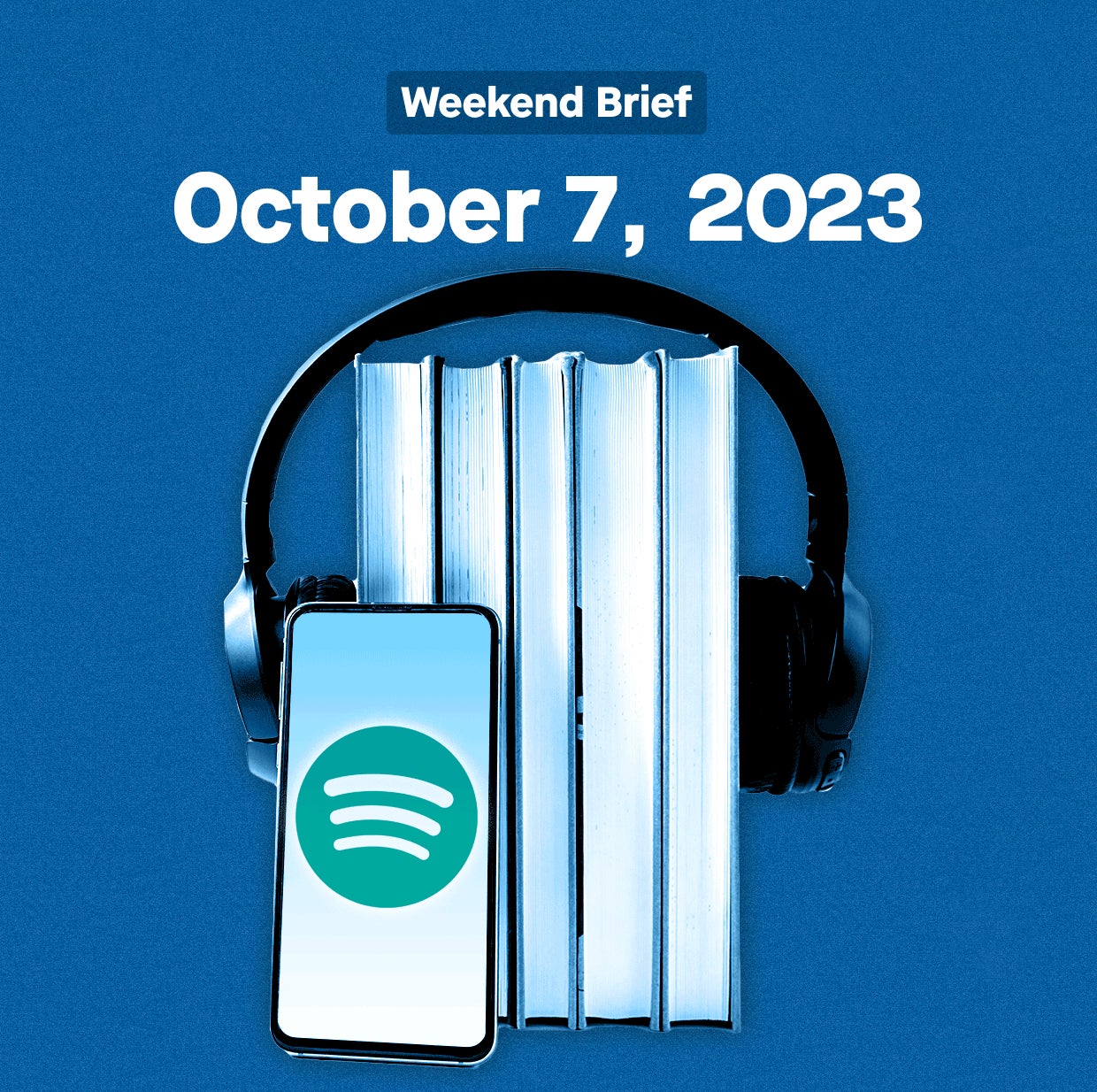Spotify's latest chapter
The streaming giant's new audiobooks push is less risky than its push into podcasts


Hi, Quartz members!
This week brought news that Spotify, already home to millions of songs and podcasts, is now including access to more than 150,000 audiobooks as part of its premium subscription plans.
Spotify’s paying users—individual account holders or plan managers for Family or Duo accounts—in the UK and Australia are immediately getting 15 hours of free audiobook streaming per month as part of their plans, with US users set to follow later this year.
It all sounds straightforward enough. Then again, Spotify is known for making sometimes inadvertently dramatic entrances into new audio markets.
When the Swedish streaming service first got into the audiobooks business last year, making hundreds of thousands of titles available for à la carte purchases, Apple got in the way. Specifically, the iPhone maker’s app store’s 30% fee for in-app purchases became a flash point. Spotify found a temporary workaround by allowing audiobooks to be purchased in the Spotify Web Player. But this latest option is far more convenient and less cumbersome for users.
If Spotify can convert more music and podcast fans into audiobook listeners, it will be an important milestone in a fast-growing segment with plenty of headroom. The global market for audiobooks quickly scaled into a $7 billion business, but that still represents less than 5% of the total book market.
Smoother than podcasts?
Spotify is arguably more ready for this next chapter than it was for its last big one—podcasts.
While Apple’s podcast app introduced listeners to the concept in the mid-2000s, Spotify gave the medium wings. In June 2018, Spotify co-founder and CEO Daniel Ek announced a $500 million investment in developing the company’s podcasting business. Today, one in four podcast listeners use Spotify, versus one in five for Apple.
But the journey wasn’t free of hiccups. Spotify learned the hard way that exclusivity and gate-keeping wasn’t the answer to growth. As its market share stagnated, Ek admitted to “overpaying” and “over-investing” in the segment later. Now it’s equipping creators with AI translation tools to render their podcast episodes in different languages, but in their own voice—or at least an impressive enough simulacrum of it.
Arguably, audiobooks will be a lower investment and higher reward foray for the streaming giant compared to podcasts. For one, Spotify already has the data, engineering, and recommendation tools firmly in place, thanks to its other audio products. Plus, the audiobooks market is far more established than the market for podcasts, and its annual growth is in the double-digits.
Perhaps most importantly from a competitive standpoint, the company’s app will do what Apple’s suite of separate, pre-loaded apps can do, but Spotify will do it all in one place. As the company advertised it in a blog post this week: “Not only can you listen to some of your favorite authors’ works, but you can also tune into podcasts where fans dissect the most minor details of a story and find the hidden meaning in every sentence, without leaving the app.”
Quotable:
“Just like we have brought 100 million new listeners to Podcast, I believe we can bring a whole new generation of listeners to Audiobooks. 📚🎧”
—Spotify CEO Daniel Ek in an Oct. 3 LinkedIn post
Audiobooks, by the digits
$1.8 billion: US audiobooks revenue in 2022,
$5.3 billion: Global revenue for audiobooks in 2022, including $1.8 billion in the US, on the heels of a decade of double-digit revenue growth and corporate investment by major publishers and tech bigwigs
$35 billion: Projected global revenue for audiobooks in 2030
57%: Share of audiobook listeners between the ages of 18 and 44
65%: The market share for Audible, Amazon’s audiobooks platform, in 2022
220 million: The number of Spotify Premium customers worldwide, which could help publishers’ reach
70%+: Share of bestselling books included in Spotify’s premium membership plans. The company says the app features titles from major publishers such as Hachette, HarperCollins, Macmillan, Penguin Random House, Simon & Schuster, and RB Media, as well as indie shops like Bolinda, Dreamscape, and Pushkin. Some, like HarperCollins and Penguin Random House, are providing access to their entire audio catalogs, while others, like Macmillan, are starting with a portion, according to the New York Times.
$10.99: The extra fee Spotify premium subscribers can pay to hear 10 more hours of audiobook content once their 15-hour allotment is used up
32 hours: Length of the Napolean Bonaparte biography audiobook on Audible. That would require more than two months of free listening time with the Spotify Premium membership to finish it
One 🔥 thing: AI-narrated books are here
Apple recently unveiled a series of books narrated by “digital voices.” The company aims to paint the AI-renditions as democratizing, claiming that the technology is “empowering indie authors and small publishers.” Maybe so. But it also raises several ethical red flags, whether in keeping users in the dark about the artificiality through vague descriptions, exploiting the work of existing voice artists, or letting big tech alone call the shots.
Thanks for reading! And don’t hesitate to reach out with comments, questions, or topics you want to know more about.
Have a 1.5x weekend!
—Ananya Bhattacharya, reporter